7 Crore+ Customers

Affordable Premium


What is Dual Citizenship in India and How Does it Work?
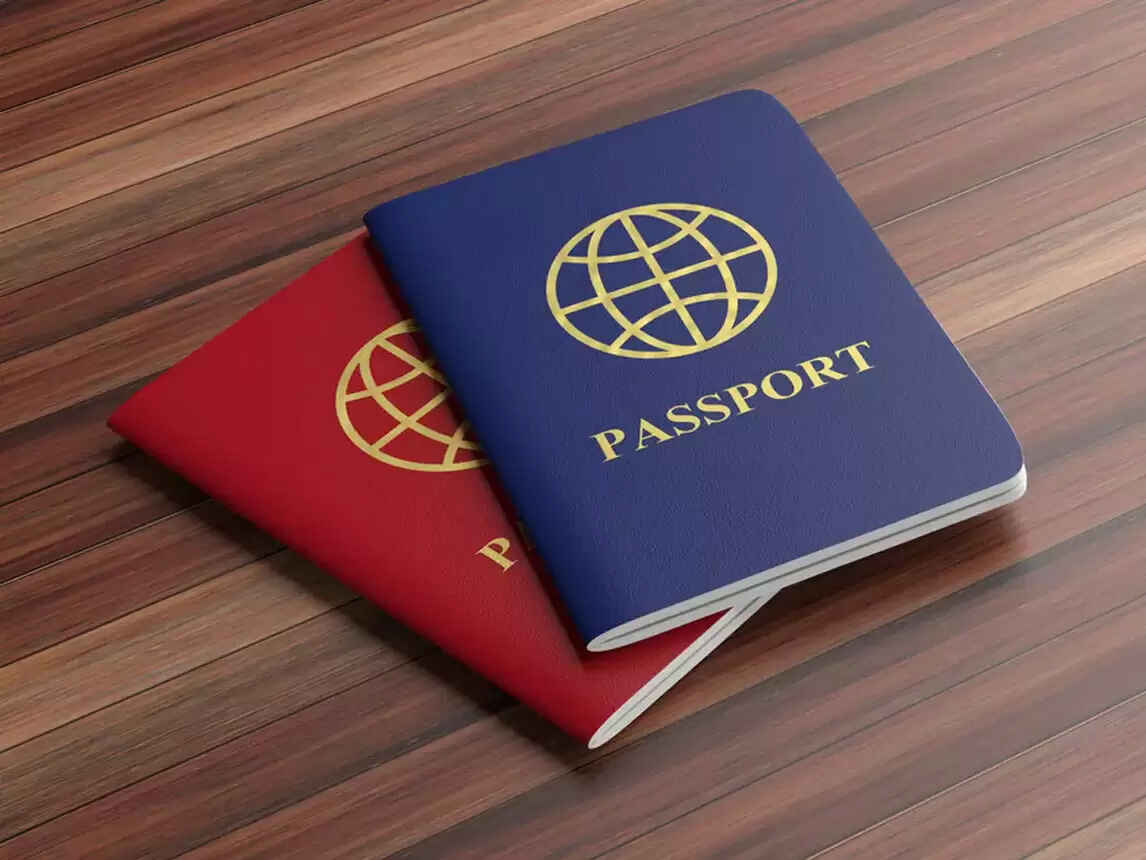
Dual citizenship, also known as dual nationality, is a legal status that allows an individual to be a citizen of two countries simultaneously. This status enables individuals to enjoy the rights and benefits of both nations, including the freedom to live, work, and travel in either country and access social services.
However, only some countries allow dual citizenship, and the rules can vary by country. The article discusses the topic of dual citizenship, explaining the eligibility criteria, advantages, and how to apply for dual citizenship.

Table of Contents

What is Dual Citizenship?
The term "dual citizenship" denotes the status of holding citizenship of two nations. Thus, dual or multiple citizenship allows individuals to simultaneously work, study, and reside in two or more nations.
Additionally, dual citizens benefit from various privileges, including access to high-quality education, healthcare, and social security. Possessing dual citizenship also enables holding multiple passports, facilitating seamless travel between countries. Moreover, you get quality privileges such as education, healthcare, social security, etc.
You can hold citizenship in two countries if you were born there, have ancestors from there, married a citizen, or have gone through the naturalisation process. While dual citizenship offers several advantages, it also comes with responsibilities, such as paying taxes to both countries and obeying the laws of each.
Additionally, different countries have varying regulations for accepting and managing dual citizenship, so it's crucial to understand the specific rules of the countries involved.
Is Overseas Citizenship of India (OCI) and Dual Citizenship the Same?
The Indian Constitution doesn't allow holding Indian and foreign citizenship simultaneously. However, the Government of India has decided to grant Overseas Citizenship of India (OCI), which is also known as dual citizenship.
What is a Second Passport?
A second passport is an additional passport from a country other than your country of citizenship. It allows you to travel more freely between the issuing country and other nations that grant visa-free access to its citizens.
People often seek second passports for various reasons, such as increased travel freedom, business opportunities, personal security, and potential tax benefits. Below, you will find information about the benefits and methods of obtaining a second passport.
Difference Between Dual Citizenship and Second Passport
Does India Allow Dual Citizenship?
No, the Indian Constitution does not allow dual citizenship for its residents. Instead, an Indian can acquire a second passport from a chosen country. However, they are obligated to lose Indian citizenship.
The Passports Act of 1967 mandates that every Indian resident surrender their passport to the nearest embassy after receiving another country’s nationality.
What are the Drawbacks of Dual Citizenship in India?
Here are some drawbacks of dual citizenship in India:
India does not allow for dual citizenship. People who become citizens of another country may make you lose your Indian citizenship.
Dual citizenship can affect your rights, such as voting, owning property, and accessing government services.
Applying for dual citizenship can be complicated and costly. Legal help is often required to navigate immigration procedures.
Remember that everyone's situation is unique, so carefully considering the pros and cons is essential.
How Do People Get Dual Citizenship in India?
People can obtain dual citizenship through descent, marriage, naturalisation, or investment.
| Birth: | If you are born in a country that offers citizenship by birthright, you automatically become a dual citizen. |
| Descent: | Some countries grant citizenship based on descent and allow dual citizenship if a parent is a citizen of another country. |
| Marriage: | Marrying a foreign national can result in dual citizenship in some countries. |
| Investment: | Some countries offer citizenship or residency through investment in real estate, businesses, or other ventures for dual nationality. |
Under What Conditions Can Indians Obtain Dual Citizenship?
The Indian Constitution does not allow dual citizenship. However, the Indian Government has introduced the Overseas Citizenship of India (OCI) for Persons of Indian Origin (PIO). PIOs can apply for registration as an Overseas Citizen of India (OCI).
The conditions for obtaining dual citizenship are as follows.
Individuals must have lived in India for at least 7 years.
When you become a citizen of another country, you must give up your Indian citizenship because India does not allow dual citizenship.
You can apply for OCI status if you are a former Indian citizen, descendant of an Indian citizen, spouse of an Indian citizen, or OCI cardholder.
Individuals who have ever been citizens of Pakistan or Bangladesh or their descendants are not eligible for OCI.
Who is Eligible to Get Dual Citizenship?
Dual citizenship is not allowed in India. However, individuals registered as OCI for at least five years and residing in India for at least one year can apply for Indian citizenship. Being an OCI allows individuals to reside in India as domestic citizens while holding citizenship in another country.
In terms of Indian citizenship, applicants need to fulfil the mentioned parameters.
An individual ordinarily residing in India for at least seven years can apply for Indian citizenship.
Individuals married to an Indian citizen can also apply for Indian citizenship.
An adult with Indian parents is eligible for Indian citizenship. However, they must have resided in India for at least one year.
A minor whose both parents are Indian citizens or one of them is an Indian citizen.
A person registered as an overseas citizen of India for five years.
Foreign nationals eligible to become Indian residents on 26 January 1950 or have been citizens of India at any time after 26 January 1950 or belonged to a territory that became part of India after 15 August 1947.
How to Apply for Dual Citizenship in India?
The application process for dual citizenship also varies according to country. Citizenship can be acquired through various channels, including birth, naturalisation, marriage, ancestry, and application, each with specific criteria and procedures. Dual Citizenship in India is not allowed. However, if you opt for an OCI card, you must apply online and submit documents.
Here’s how individuals wondering to get dual citizenship in India can apply for an OCI card instead:
1. Visit the Official Website
Visit the official website of Online Overseas Citizen of India (OCI) Services and register.
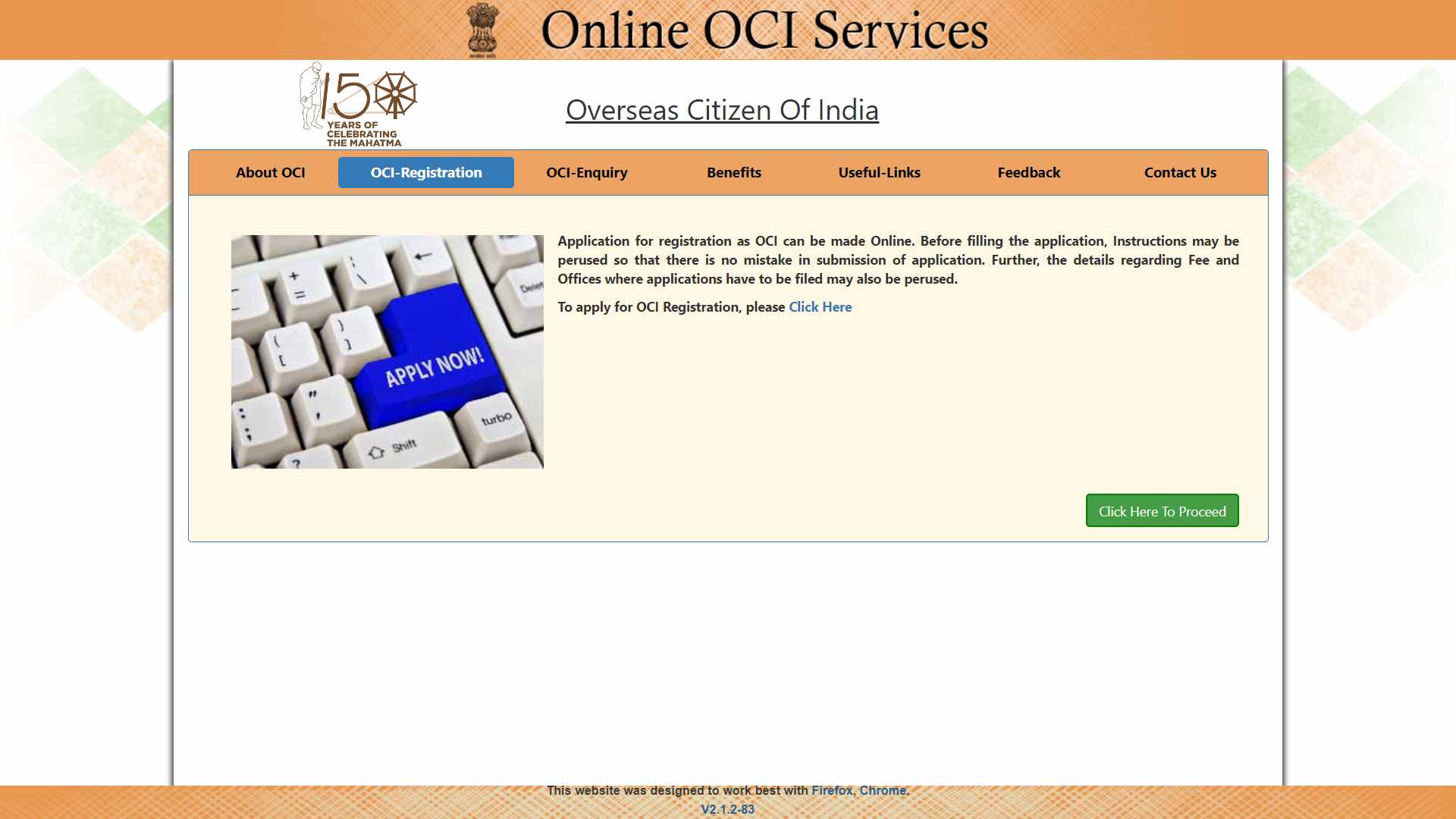
2. Check the Eligibility Before Apply
Before applying, it is crucial to check your eligibility, It is important to note that individuals of Pakistani and Bangladeshi origins, as well as those with affiliations to the military, are ineligible for this process.
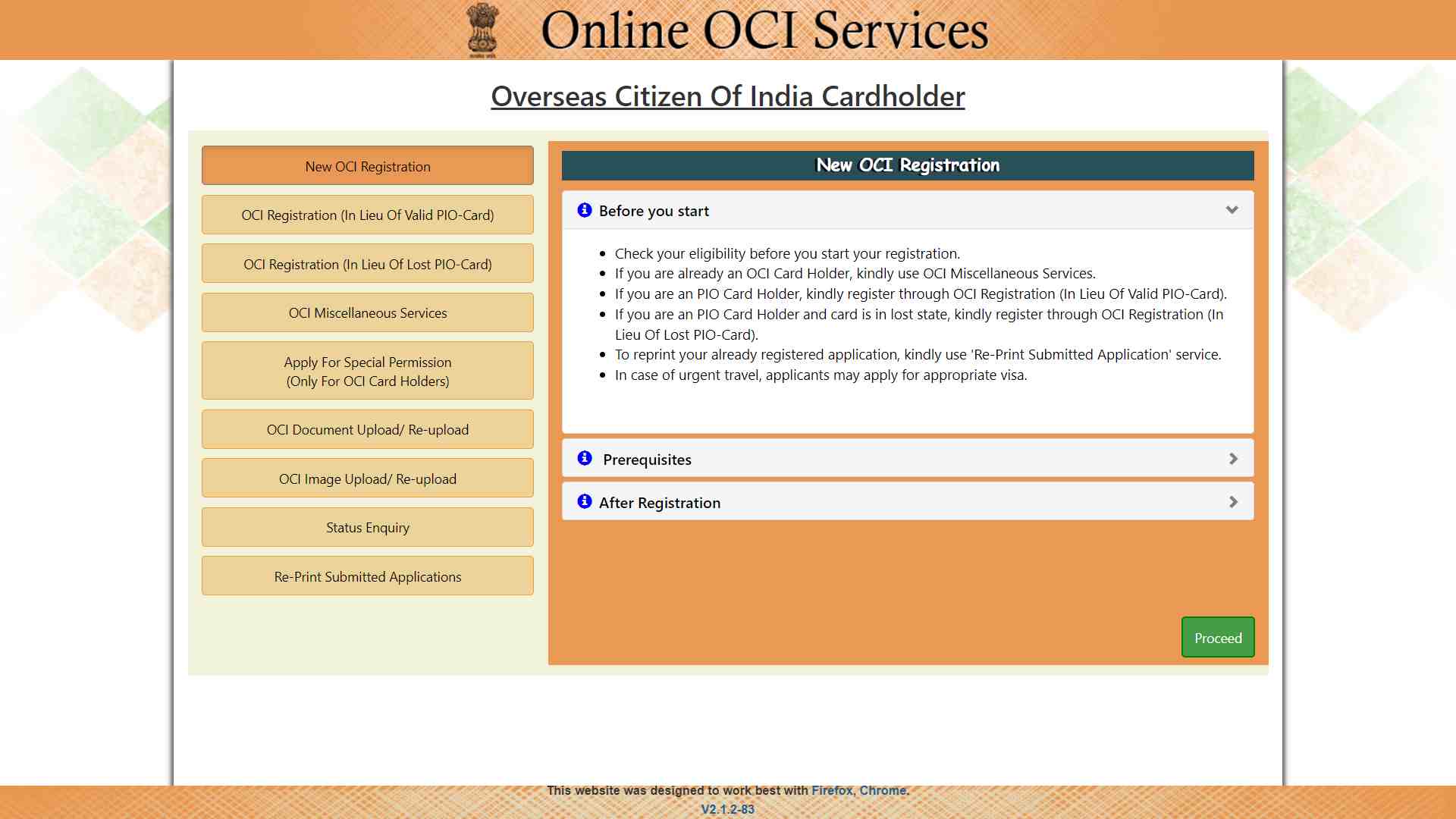
3. Get all the Documents Required
Gather all the required documents, including a current passport, proof of Indian origins, proof of relationship, photographs, and additional documents.
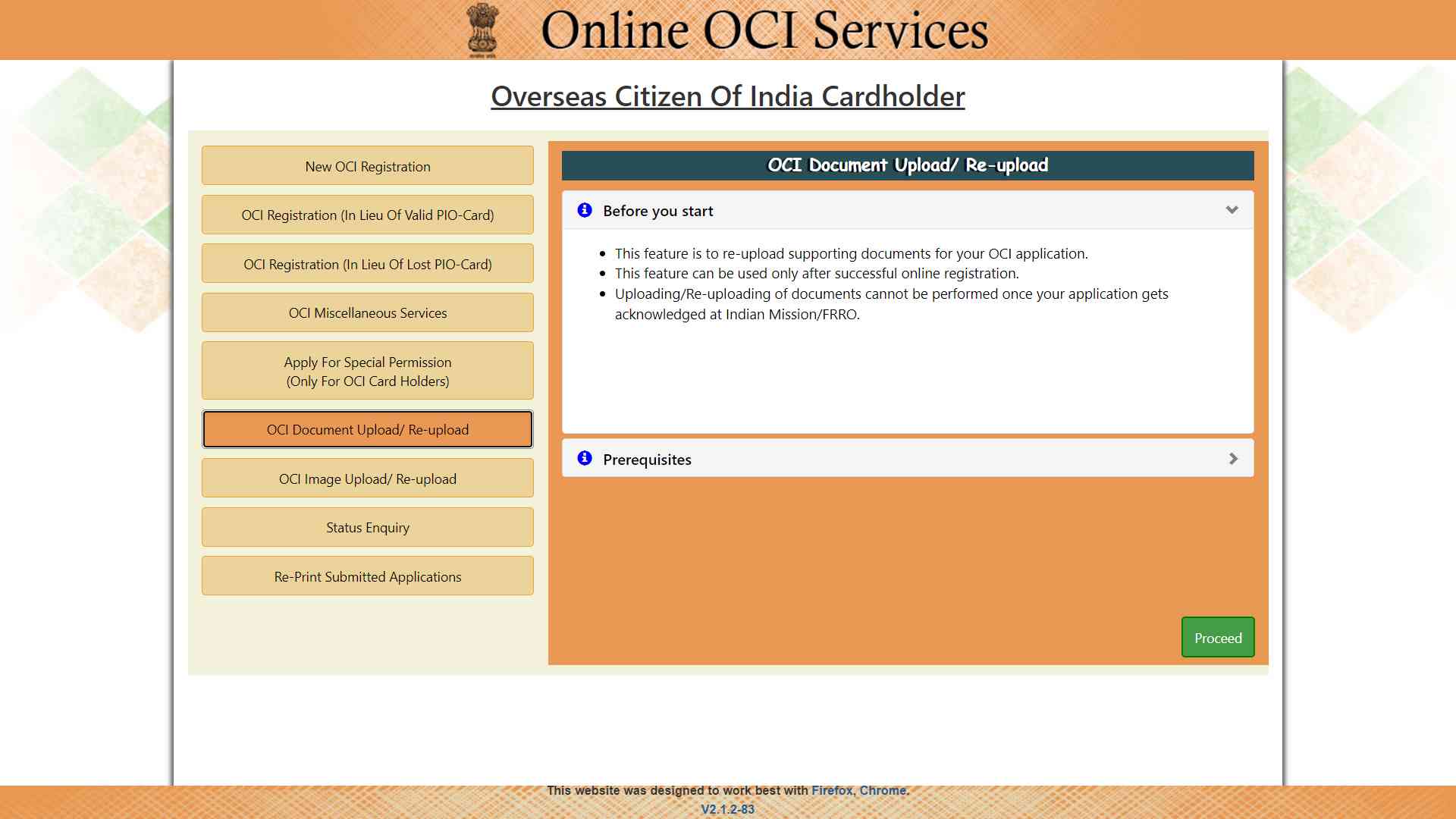
4. Fill Out the Form
Click “Apply Online”, fill out the form with accurate details and submit it.
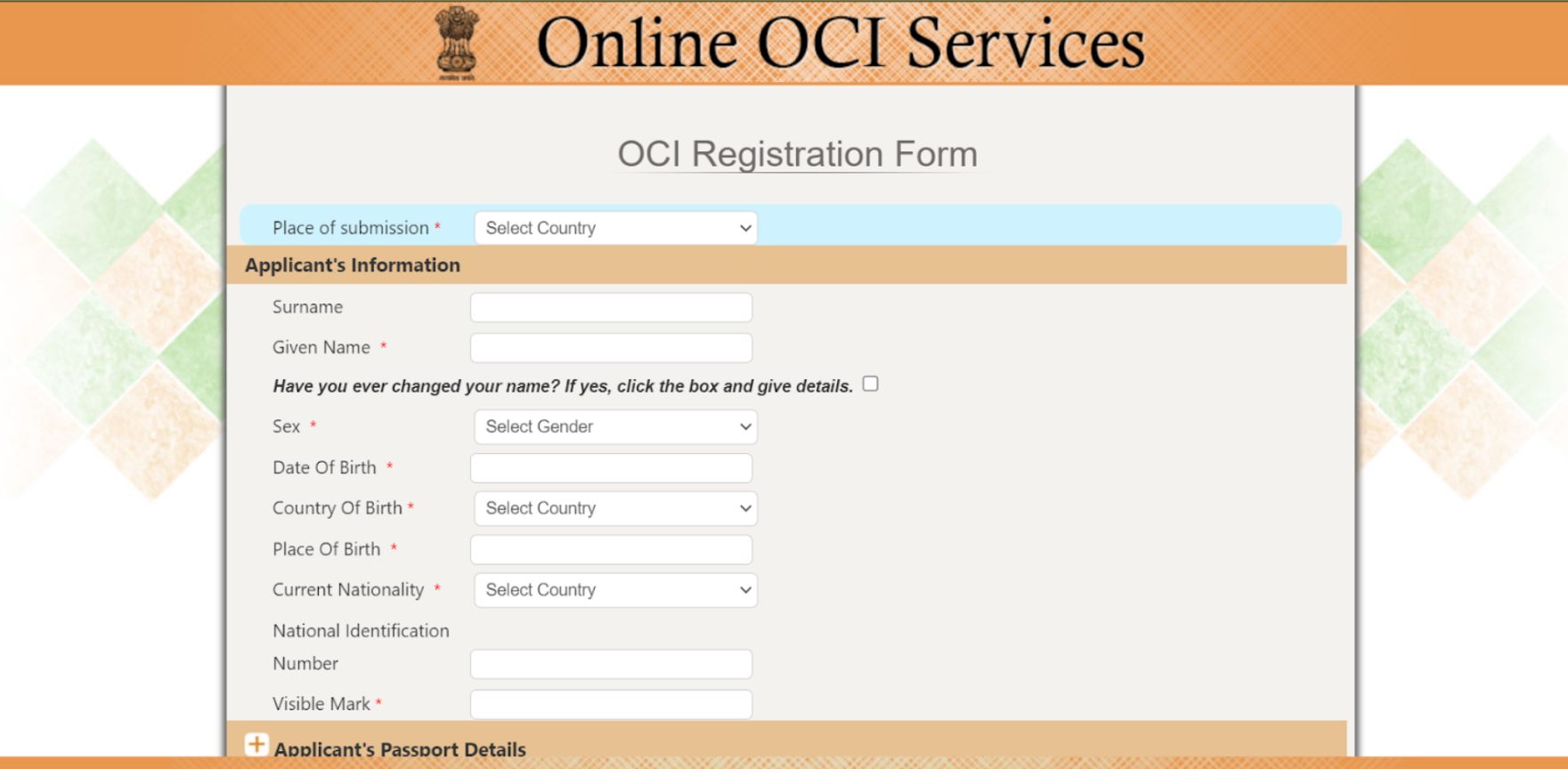
5. Generate two hard copies of the ITAR number.
Get two hard copies and take two printouts of the filled-in application with the ITAR number. This number looks like this -ITAR00000511, for instance.
Documents Required to Apply for Dual Citizenship in India
Individuals must submit the following documents when applying for an OCI card -
- Proof of present citizenship
- Copy of the cancelled Indian passport, along with the original passport. This passport must have a drill stamp.
- Evidence of relationship as parent/grandparent, if their Indian origin is claimed as basis for grant of OCI
- Residential proof
- Details of an applicant's present and previous job profile
- PIO cardholders need to submit a copy of their cards
- The submitted photos must have a light colour background except for white.
In the case of a minor child, these are the mandatory documents required:
· Copy of the passport of the parents or Domicile Certificate or Nativity Certificate.
· Child’s birth certificate.
· If parents are divorced, the court order of marriage dissolution, mentioning the custody of the child is given to the parent who has the OCI card.
Now let's check the countries that allow dual citizenship for hassle-free applications.
What are the Benefits of Dual Citizenship?
Let's explore the dual citizenship benefits:
Expanded Travel Opportunities: Dual citizenship provides the benefit of possessing two passports. This allows you to travel to more countries on arrival, enhances your mobility, and opens up new destinations to explore.
More Business Opportunities: Dual citizens can tap into economic opportunities in both countries. You can work, invest, and own property in either nation, benefiting business ventures and career growth.
Civil Privileges: Dual citizens enjoy full political rights in both countries. They can vote, participate in politics, and enter their country of citizenship unconditionally, ensuring a broader range of civil liberties and freedoms.
Healthcare Benefits: Dual citizenship may give you access to healthcare services in both countries. You can choose the healthcare system that best suits your needs.
Higher Education: Dual citizens can pursue education in either country, potentially benefiting from different educational systems, scholarships, and research opportunities.
Reducing Taxes: Depending on each country's tax laws, dual citizens may strategically manage their tax obligations. However, to avoid double taxation, it's essential to understand the tax implications.
Security and Stability: Holding citizenship in two nations provides a safety net. If one country faces instability or political challenges, you have an alternative place to reside and seek protection.
What are the Benefits of a Second Passport?
Travel Freedom: This provides access to countries that may be difficult to enter with your primary passport and helps you bypass travel restrictions imposed on certain nationalities.
Business Opportunities: It helps to create better business opportunities in the issuing country and its trade partners, making business travel smoother by avoiding visa delays and restrictions.
Personal Security: It provides a safe place during political instability or civil unrest and offers an alternative option during emergencies or conflicts.
Financial and Tax Benefits: In some countries, you can save on taxes and easily access international banking and investment opportunities.
Education and Healthcare: It provides access to top-tier education and healthcare in the issuing country, improving the educational prospects of the passport holder's children.
What are the Disadvantages of Dual Citizenship?
Here are the disadvantages of dual citizenship:
The Complexity of Legal and Tax Issues: Possessing dual citizenship can give rise to complicated legal and tax implications.
Obligations to Multiple Countries: Dual citizens may bear responsibilities to both countries of citizenship, spanning military service, voting, and tax obligations.
Travel Restrictions: While dual citizenship can afford enhanced access to multiple countries, it may also entail travel constraints.
Additional Costs: Dual citizenship can entail considerable expenses, encompassing fees for passport applications and renewals, legal representation, and tax compliance services. Moreover, some countries may levy taxes or fees to maintain citizenship, increasing the financial burden.
Benefits of Overseas Citizenship of India (OCI)
OCI (Overseas Citizenship of India) status allows foreign citizens of Indian origin to live, study, or work in India. OCI card holders can visit India anytime and stay for any duration.
Individuals with dual citizenship or OCI can enjoy benefits such as:
Independence to live, work, and continue business in India and the chosen country indefinitely.
Multiple entry life-long visas.
Own assets and property.
Registered OCI will be charged the same entry fee as domestic Indian visitors to visit wildlife sanctuaries and national parks in India.
Parity with NRIs to appear for the All India Pre-medical Test or other tests. Hence, they are eligible for admission per the provisions of the relevant Acts.
Individuals can have multiple passports.
Chances of getting a “visa on arrival” if the other country's passport is stronger than the home country.
With a second passport, an OCI holder can relocate to a country to which they have citizenship if there is any turbulent situation in the other country.
Individuals can apply for Indian citizenship after conceding their foreign citizenship. However, this factor depends on the updated terms and regulations.
List of Countries that Allow Dual Citizenship
In some countries, it is easy to get citizenship. The following list shows the dual citizenship countries.
List of Countries that Do Not Allow Dual Citizenship
Some countries that do not allow dual citizenship are:
Dual citizenship is being a permanent resident in two countries simultaneously. It grants individuals the freedom to enter, reside, work, conduct business, and own property in both nations. In the event of social or political unrest in one country, dual citizens can reside in the other.
Additionally, they may seek refuge in a third country with one of their citizenship countries having bilateral solid ties. It is important to note that certain countries do not permit their citizens to hold passports from another nation concurrently, thereby prohibiting dual citizenship.












